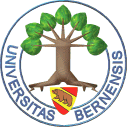| Mineralogisch-petrographisches
Instititut Universität Bern Baltzerstrasse 1 CH-3012 Bern Schweiz - Switzerland Tel +41 (0)31 631 87 81 Fax +41 (0)31 631 48 43 http://www.earthsci.unibe.ch/ |
Section des Sciences de la Terre Université de Genève Rue des Maraîchers 13 CH-1211 Genève 4 Suisse - Switzerland Tél. +41 (0)22 702 6628 Fax +41 (0)22 320 5732 ursula.eigenmann@terre.unige.ch www.unige.ch/sciences/terre/welcome.html |
This is an archive page. Links, addresses, phones are outdated.
 |
Cours 3e cycle romand
en Sciences de la Terre |
 |
Thermodynamic Models in Hydrothermal and Environmental Systems
Professor G.M. Anderson, University of Toronto
October 16-19 and 23-26, 2000
Topic: Chemical models based on simple thermodynamic principles are powerful tools in pure and applied Earth sciences. The geologist attempting to understand, for example, the formation of an ore deposit or dealing with a specific environmental problem is typically faced with "messy" systems. For such situations, it cannot be the goal of any simple model to mimic nature in detail. Rather, thermodynamic models are developped and applied as a working tool, to help us think, to provide guidance on what and where measurements or observations are useful, and to delimit how a complex system behaves in the limit of chemical equilibrium . It turns out that such an approach is useful even where equilibrium is unlikely to be attained (e.g. in low temperature sytems).
Contents: This course will first introduce the concepts and terms of chemical thermodynamics required in constructing models. The second part will address especially models of hydrothermal and low-temperature (environmental) systems. The course will present theory, examples, and case studies aimed to show the potential and limits of thermodynamic models. Throughout the course, essential practical work will be part of the program, teaching the participants to apply models properly and to interpret results carefully.
Format: The course will consist of two parts of 4 days each:
(A) Fundamentals October 16-19 (Monday-Thursday) University of Geneva
(B) Applications October 23-26 (Monday-Thursday) University of Bern
Lectures and intensive practical sessions (most of them with computer support) will be mixed as useful. The two parts are self-contained. Participants with sufficient background may choose to follow the second part only. The course will be taught in English, but in discussions and practicals French and German are welcome as well.
Level and certificate: Part (A) will start by reviewing elementary thermodynamics briefly, at the level of an introductory course on phase petrology or chemical thermodynamics. S Part (B) will build on this and expand to look at case studies, typical problems, and applications. The course will use the textbook by G.M. Anderson "Thermodynamics of Natural Systems" (Wiley) which participants have the possibility of acquiring at the greatly reduced price in Bern or Geneva. Participants should have read chapters 1-5 of this book before beginning the course. Participants needing a certificate will have to pass successfully a test at the end of each part.
Presentation: This course will be taught by Professor G.M. Anderson from University of Toronto. He is a renowned specialist in the thermodynamics of geochemical systems, and an exceptional teacher in this field. He has published several outstanding textbooks on thermodynamics in the Earth Sciences.
Organisation: This course is organised by Prof. L. Fontboté (University of Geneva) and Prof. M. Engi (University of Bern) who will provide further information on request. Please contact fontbote@terre.unige.ch or engi@mpi.unibe.ch.
Further organisation details will be posted on http://www.unige.ch/sciences/terre/admin/terre_sem.html
Please register for this course by writing to Mme. Isabelle Jobin, MPI, University of Bern, Baltzerstrasse 1, 3012 Bern (jobin@mpi.unibe.ch). Deadline for registration is October 5, 2000.
Maximum number of participants: 24
Costs: For participants from one of the CUSO universities all costs of travel, participation, and accomodation are borne by the 3e cycle. This course is also open also to students at diploma level. Space permitting, participants from non-CUSO universities may be allowed, but they will need to pay for their own travel, meals and accomodation.
IMPORTANT UPDATE (3 October 2000):
- Both parts of the course will take place in Geneva.
- The course takes place at rue des Maraîchers 13, salle informatique B21,
1211 Genève 4, from 8:30 to 12:00, and 13:30 to 17:00, except Monday
16, where we start at 9.00.
- The books have arrived and are available in office 604 of Maraîchers
13.
- No more inscriptions are possible as the course is complete.